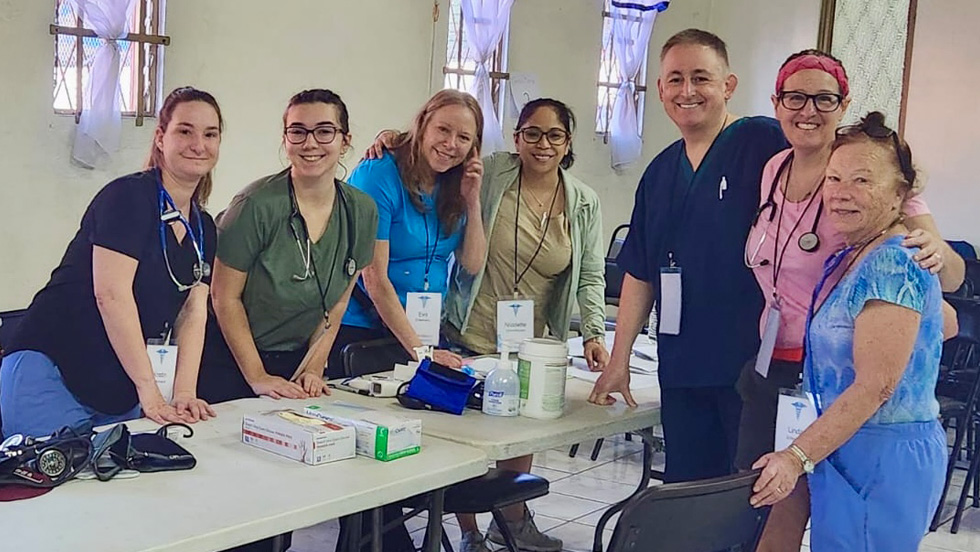
From Ground Zero to COVID-19 to communities around the globe, Clinical Associate Professor K.C. Rondello, MD, has devoted his career to helping protect our health. In January, he traveled with a group bringing medical services to people from underserved communities abroad. His dozens of such international experiences have spanned five continents over 15 years.
When K.C. Rondello, MD, clinical associate professor in the College of Nursing and Public Health and acting head of Adelphi’s emergency management master’s program, traveled to Costa Rica for 10 days in January, it wasn’t the typical vacation getaway that many enjoy in the winter months. Instead, he was part of a service and training group setting up temporary medical clinics in underserved rural areas.
The 15-member team–organized by the Family Medicine Residency program at New Jersey’s Hunterdon Healthcare, where he has served on the board for eight years–provided primary care to more than 750 patients at five locations during the trip. For Dr. Rondello, it was his first service deployment since the COVID-19 pandemic, during which he was appointed Adelphi University epidemiologist, but far from his first such trip.
“I have done quite a bit of international volunteer work, most of it medical and public health projects,“ Dr. Rondello said. “I find great satisfaction in the pro bono work I do. While I enjoy being involved in the community in other ways, serving in medical roles takes advantage of my expertise and experience.”
Joining Adelphi as an adjunct in 2003, full time in 2005, Dr. Rondello helped a national and international audience understand the COVID-19 pandemic as an authority frequently quoted by the news media—as he had for years with other public health issues such as influenza.
“My mother died when I was young and that experience has always made me appreciate the limited time that we have,” Dr. Rondello said. Since 2009, he has participated in dozens of volunteer service deployments to countries on five continents, working with nongovernmental agencies including ProWorld, Globe Aware, International Volunteer HQ, Maximo Nivel (a Latin American volunteer and educational organization) and the Yale Alumni Service Corps, as well as Adelphi programs.
The recent trip to Costa Rica was originally planned for Guatemala but was changed at the last minute due to political unrest. This trip—Dr. Rondello’s fifth to Costa Rica—included family practice faculty and residents from the Hunterdon program, but also nurses, a physician’s assistant, pre-med college students and even a few high school students. They were based in Costa Rica’s capital, San José, but set up mobile clinical spaces in schools and churches, some locations well developed but others fairly rudimentary—all in medically underserved areas. They took with them tens of thousands of dollars’ worth of medical material, some donated by nongovernment organizations that support such trips as well as local businesses. The team traveled light in terms of personal possessions, using their luggage allotments for supplies.
“Costa Rica is a country with universal healthcare, but with an asterisk—people who are unemployed or not citizens are not covered,” said Dr. Rondello. “There are many immigrants from neighboring Nicaragua who deal both with poverty and lack of medical services.”
Many of the clinic patients came for routine healthcare, though a few presented with serious conditions. One child, for example, was so weak that he had to be carried to the clinic by his mother due to a high fever and lethargy. With IV fluids and medicine, a few hours later he was playing soccer with friends. Another individual had a serious infection that required surgical debridement—”not an ideal thing to have to do in a dusty mobile clinic, but there really was no option,” Dr. Rondello noted.
Volunteering Where Need Is Greatest
Dr. Rondello’s last service deployment was scheduled for Ecuador during spring break 2020. Fortunately, in retrospect, it was canceled as in that time frame, return to the United States would have been complicated with borders closing in response to the developing COVID-19 pandemic. He was also a longtime volunteer for EMS operations in Long Island and on September 11, 2001, the first day of a new job at North Shore-LIJ Health System, he was sent to the World Trade Center site to help—where he worked for six weeks, first at Ground Zero and then at a mobile hospital set up at Chelsea Piers. Like many involved in that effort, he suffers long-term health issues, though he’s grateful to have medical support from the World Trade Center Health Program and his personal physician.
Back at Adelphi, his personal and professional experiences directly add to what he shares in the classroom.
“So much of my international service work ties into what I teach,” he said. “Underserved communities, lack of access to care … these are big issues in the United States as well. The experience also gives me ‘street cred’ with students, as they see that I am actively doing what I am teaching them about.”